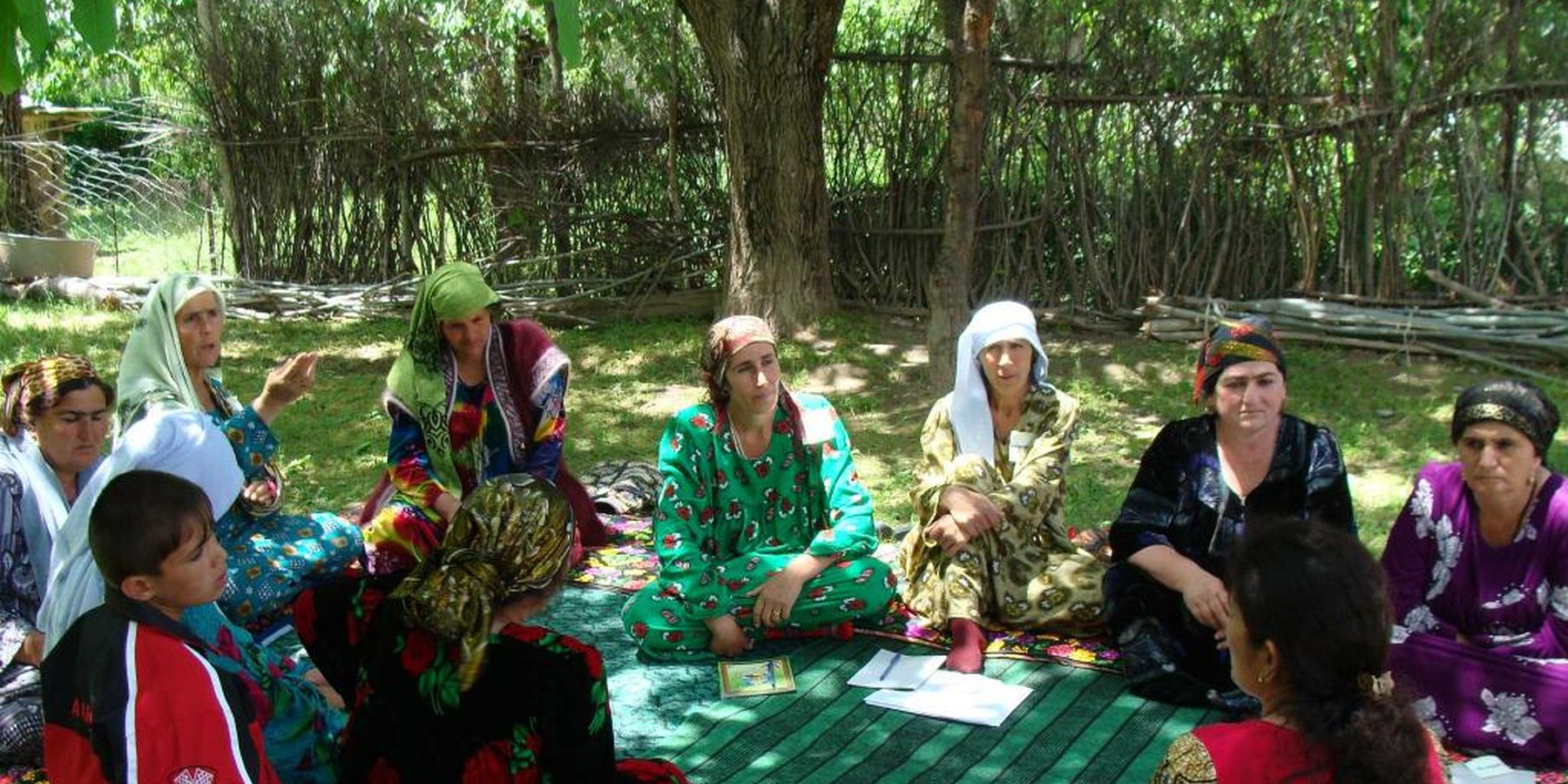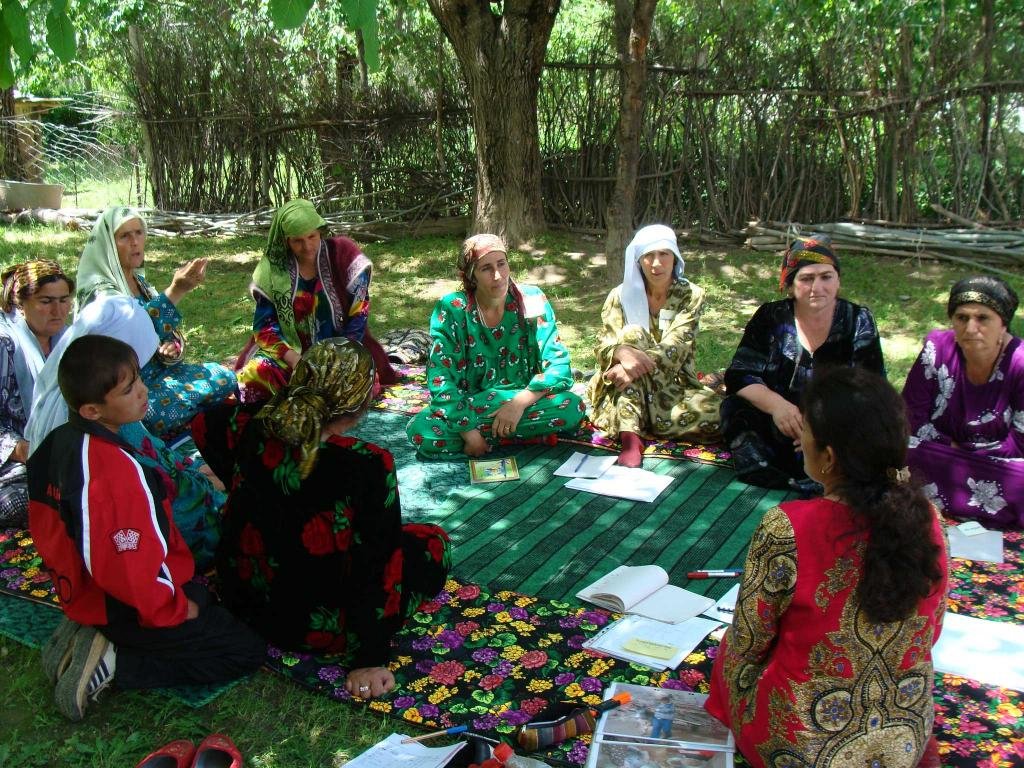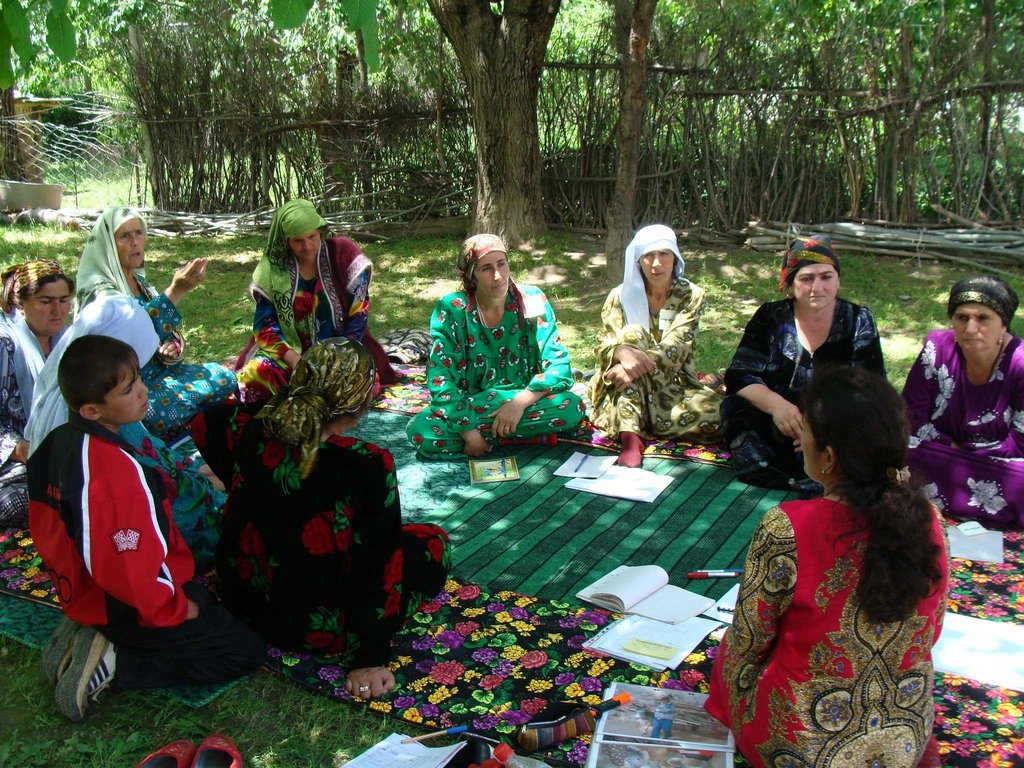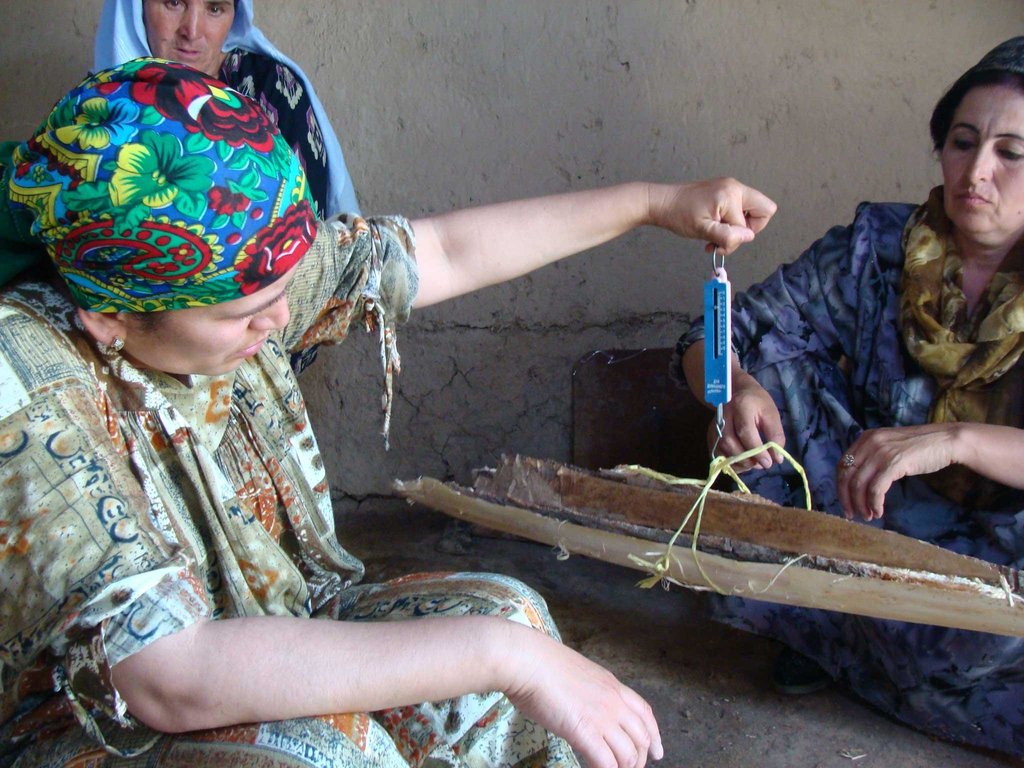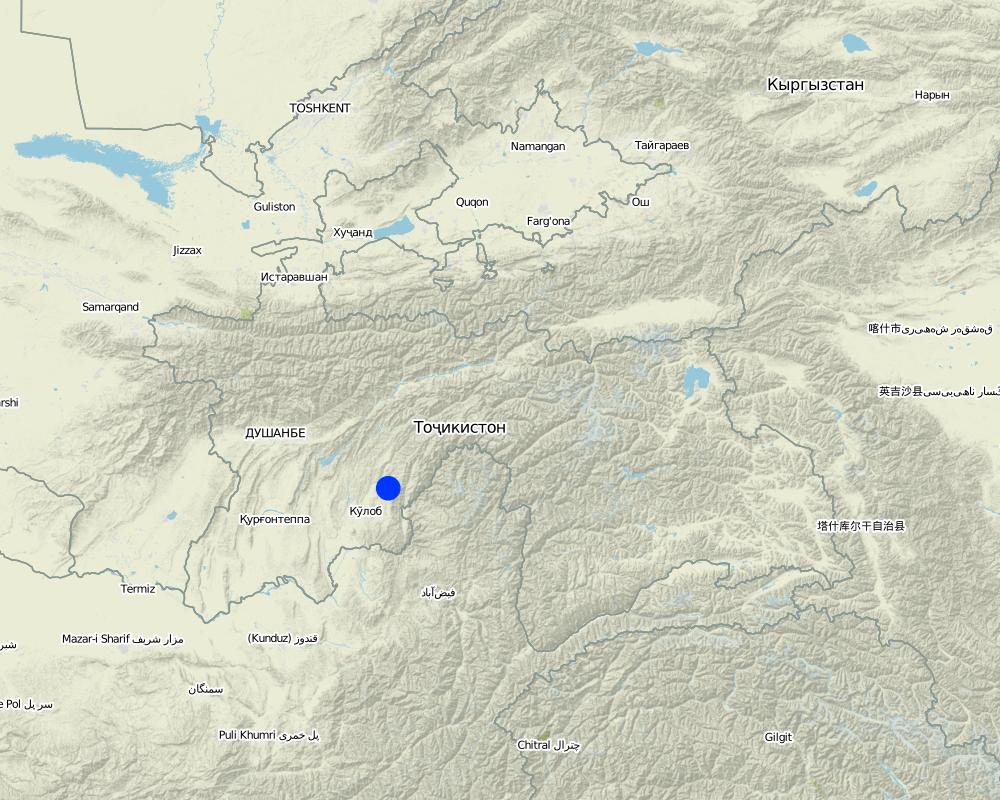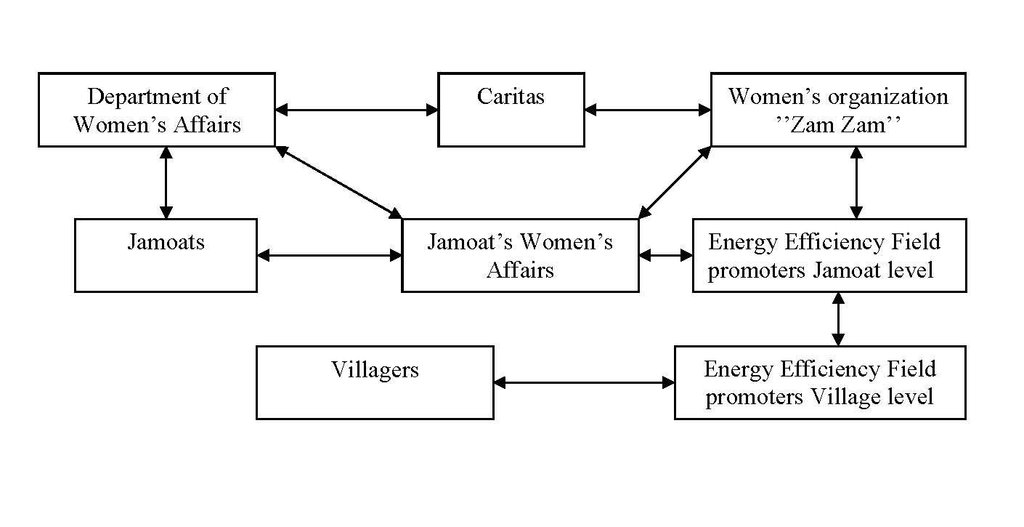Implementation through the government's Women's Affair Officers. [塔吉克斯坦]
- 创建:
- 更新:
- 编制者: Sa'dy Odinashoev
- 编辑者: –
- 审查者: David Streiff, Alexandra Gavilano
approaches_2449 - 塔吉克斯坦
查看章节
全部展开 全部收起1. 一般信息
1.2 参与方法评估和文件编制的资源人员和机构的联系方式
SLM专业人员:
1.3 关于使用通过WOCAT记录的数据的条件
(现场)数据是什么时候汇编的?:
06/07/2009
编制者和关键资源人员接受有关使用通过WOCAT记录数据的条件。:
是
2. SLM方法的描述
2.1 该方法的简要说明
The use of the government appointed District Womens Affair Officer to mobilise women throughout the community to implement technologies.
2.2 该方法的详细说明
该方法的详细说明:
Aims / objectives: The aim of the approach was to empower women through support from the government’s Women's Affairs Officer (WAO), to implement low cost energy efficient technologies within individual households. Women being the primary users of energy within the household, can become the main agents for change in applying more efficient methods to the use of natural resources to meet their cooking, heating and energy needs. Therefore, reducing fuel costs, and dependence upon local natural resources. The district local government employs a WAO, who is the government representative for women’s issues in the district. Once the WAO became supportive of the idea, she was able to engage the Women’s Affairs Officers at the Jamoat level.
Methods: This approach is fundamentally a training pyramid approach. An expert conducted a series of training sessions to interested women on the details of the technology. The training involves demonstrations of the technology, it's benefits, information on how to purchase or make the material required, and how to implement the technology. The first session is a ‘Training of Trainers’. The participants are then provided with training materials, and are invited to replicate the training in their own community. The process is continuously repeated, subsequently broadening the target audience. Zamzam, the local women’s association of the district helped suggest potential community candidates for trainers, and provided practical training sessions on energy efficiency measures through the TOT.
Stages of implementation: The implementation of the project started with an inception meeting with the District Women’s Affairs Officer to sell the idea, and to gain the local government’s support. Once she was supportive of the idea, a district level meeting was held with all the Women’s Affairs Officers at the local level (i.e. Jamoat) and two women representatives from each Jamoat. At this meeting the ladies were introduced to the technology i.e. cooking stove modification and heat exchangers. The meeting further discussed on how each jamoat would receive training, and what training materials were to be distributed to the communities. The meeting enabled issues with the technology, logistics, monitoring and overall set up of the approach to be discussed. Afterwards an expert trained a group of women from each Jamoat on the technology and provided them with materials so that the training could be repeated within their own communities.
Role of stakeholders: This is a women's led approach, the Women’s' representative within the government, who are also Women’s association members, were responsible for organisation of the trainers, logistics and government documentation support. With support from Zamzam, the active women in the community were selected as trainers to receive training from the experts and provide subsequent outreach training to their communities.
2.3 该方法的照片
2.5 采用该方法的国家/地区/地点
国家:
塔吉克斯坦
区域/州/省:
Khatlon
有关地点的进一步说明:
Muminabad
Map
×2.6 该方法的开始和终止日期
注明开始年份:
2009
终止年份(若不再采用该方法):
2010
2.7 方法的类型
- governmental
2.8 该方法的主要目的/目标
The Approach focused mainly on SLM with other activities (Energy Efficiency)
The aim of the approach was to mobilise the women within the community through the use of the government appointed District Women's Affairs Officer. Once the government appointee was engaged in the promotion of the technology, she was able to use her position to mobilise the Women's Representative at the local government level (Jamoat), and subsequently women's representatives within each village level. The approach exploits the existing government's women's network to empower women to implement technologies, whilst also gaining government support and assistance.
The SLM Approach addressed the following problems: The average household in the Muminabad area uses several tonnes of tapak (dung and straw mix) and firewood each year for cooking, baking and heating. This puts excessive strain on the local natural resources, and significantly reduces the amount of organic fertiliser used in land management, as well as the removal of tree and shrubs that stabilise the land and help prevent erosion from wind, surface water run off and livestock grazing.
2.9 推动或妨碍实施本办法所适用的技术的条件
财务资源和服务的可用性/可得性
- 阻碍
At the beginning women did not know that modification of the cookingstoves were not expensive, and were initially not interested in learning about the adaptation.
Treatment through the SLM Approach: Demonstration of the technolgy and explanation of the costs.
机构设置
- 阻碍
The women have been using the same style of outdoor cooking stove for many years and did not consider or were open to changing the design.
Treatment through the SLM Approach: A group workshop created an open environment in which the women could think about their energy use, their cooking equipment and discuss potential changes.
3. 相关利益相关者的参与和角色
3.1 该方法涉及的利益相关者及其职责
- 当地土地使用者/当地社区
Women's group to conduct training on the technology and women in households
The active women in the village were selected to disseminate information
- SLM专家/农业顾问
To organise the training materials.
- 地方政府
District and local government women's affairs officers.
The entire approach was developed to engage women, as they would be the ones that would benefit most from the technology.
- 国际组织
Provided the funding and monitoring.
3.2 当地土地使用者/当地社区参与该方法的不同阶段
| 当地土地使用者/当地社区的参与 | 指定参与人员并描述活动 | |
|---|---|---|
| 启动/动机 | 自我动员 | It was members of the local community that thought of the idea and approached the governments Women's Affair Officer. |
| 计划 | 互动 | The local stakeholders organised a initial meeting to plan the implementation of the approach. |
| 实施 | 自我动员 | Implementation was entirely through the local community, including government representatives at district and local level. |
| 监测/评估 | 外部支持 | This was undertaken by the donor and at the district level. |
| Research | 无 | None |
3.3 流程图(如可用)
具体说明:
An organisational chart showing how all the organisations worked together on the project.
作者:
Odinashoev, Sa (Muminabad, Tajikistan)
3.4 有关SLM技术选择的决策
具体说明谁有权决定选择要实施的技术:
- 主要是土地使用者,由SLM专家提供支持
解释:
The idea for the approach was developed by representatives of the local community, who were interested in implementing a technology that would improve the lives of women in the community.
Decisions on the method of implementing the SLM Technology were made by mainly by SLM specialists with consultation of land users. The technology of improved cooking stoves was already developed, tried and tested, the approach orginated from already knowing which technology to implement.
4. 技术支持、能力建设和知识管理
4.1 能力建设/培训
是否为土地使用者/其他利益相关者提供培训?:
是
明确受训人员:
- 现场工作人员/顾问
- Women's groups
如果相关,请说明性别、年龄、地位、种族等。:
The project personnel provided the initial training to the women, who in turn then trained within their own communities.
培训形式:
- 农民对农民
- 示范区域
培训形式:
- Training was held within the communties.
涵盖的主题:
The training was on energy efficiency measures, and how to reduce the amount of organic material used as fuel.
4.2 咨询服务
土地使用者有权使用咨询服务吗?:
否
4.3 机构强化(组织发展)
是否通过这种方法建立或加强了机构?:
- 是,非常
具体说明机构的强化或建立程度:
- 本地
具体说明支持类型:
- 能力建设/培训
提供进一步细节:
Local NGO Zam Zam, a women's network, was used to conduct the training.
4.4 监测和评估
监测和评估是该方法的一部分吗?:
是
注释:
no. of land users involved aspects were regular monitored by project staff through observations; indicators: The quality of the training was observed.
no. of land users involved aspects were regular monitored by project staff through measurements; indicators: The number of women that received training was monitored.
There were no changes in the Approach as a result of monitoring and evaluation: None
There were no changes in the Technology as a result of monitoring and evaluation: None
4.5 研究
研究是该方法的一部分吗?
是
5. 融资和外部物质支持
5.1 该方法中SLM组成部分的年度预算
如果不知道准确的年度预算,请给出一个范围:
- 2,000-10,000
注释(例如主要的资助来源/主要捐助者):
Approach costs were met by the following donors: government (Government covered costs related to workshop for women's groups): 10.0%; international non-government (Covered the expenses such as travel and materials.): 90.0%
5.2 为土地使用者提供财政/物质支援
土地使用者是否获得实施该技术的财政/物质支持?:
是
如果是,请具体说明支持的类型、条件和提供者:
The state provided personnel support and facilities for meetings
5.3 对特定投入的补贴(包括劳动力)
- 设备
| 具体说明哪些投入得到了补贴 | 程度如何 | 对补贴做出具体说明 |
|---|---|---|
| metal door | 部分融资 | |
- 其它
| 其它(具体说明) | 程度如何 | 对补贴做出具体说明 |
|---|---|---|
| transport cost | 充分融资 | fuel, taxi |
如果土地使用者的劳动力是一项重要的投入,那么是不是:
- 自愿
注释:
It is a relatively low cost approach that required traing materials, transport and demonstration equipment. The main part of the finance was required for the implementation stage of the technology, whereby half the costs were met by the land user and the rest by the donor.
5.4 信用
是否根据SLM活动的方法给予信用值?:
否
6. 影响分析和结论性陈述
6.1 方法的影响
该方法是否帮助土地使用者实施和维护SLM技术?:
- 否
- 是,很少
- 是,中等
- 是,支持力度很大
The approach helped raise awareness on how to reduce the amount of organic material needed to meet the domestic fuel needs, and the saved material could be used as organic fertiliser.
该方法是否有助于社会和经济弱势群体?:
- 否
- 是,很少
- 是,中等
- 是,支持力度很大
It improved the cooking conditions of women, and reduced their workload in the collation of natural resources to meet the household fuel needs.
该方法是否改善了阻碍SLM技术实施的土地使用权/用户权问题?:
- 否
- 是,很少
- 是,中等
- 是,支持力度很大
Did other land users / projects adopt the Approach?
- 否
- 是,很少
- 是,中等
- 是,支持力度很大
Did the Approach lead to improved livelihoods / human well-being?
- 否
- 是,很少
- 是,中等
- 是,支持力度很大
The associated technology helped reduce smoke in the kitchens and a reduction in the amount of time, resources and finance that was spent on household fuel.
Did the Approach help to alleviate poverty?
- 否
- 是,很少
- 是,中等
- 是,支持力度很大
It helped reduce the amount of money spent on fuel and helped preserve natural resources.
6.2 土地使用者实施SLM的主要动机
- 增加利润(能力),提高成本效益比
Reduce money spent on fuel.
- 减少工作量
The associated technologies helped reduce workload.
- 规章制度(罚款)/执行
The endorsement by the district government helped influence adoption rates.
- 声望、社会压力/社会凝聚
The approach tried to include as many women as possible, the social pressure to participate grew.
- 加入运动/项目/团体/网络
To a degree there was empowerment of women.
- 环境意识
Reducing the amount of smoke in the outdoor kitchen
- well-being and livelihoods improvement
Hopefully improvement in health from less smoke, less money spent on fuel and less workload.
6.3 方法活动的可持续性
土地使用者能否维持通过该方法实施的措施(无外部支持的情况下)?:
- 是
若是,请说明如何维持:
The approach needs minimal finance to continue.
6.4 该方法的长处/优点
| 土地使用者眼中的长处/优势/机会 |
|---|
| It is easy to train a group of women, it is much harder to train men. (How to sustain/ enhance this strength: The women could benefit from further instructions on how to train. ) |
| 编制者或其他关键资源人员认为的长处/优势/机会 |
|---|
| The approach incorporates government support. (How to sustain/ enhance this strength: It may mean that further approaches and endorsements will have government support and generate further interest from the authorites.) |
| The approach is easy to replicate and has the potential to reach many beneficaries. (How to sustain/ enhance this strength: It could be replicated in other areas and regions. ) |
| The approach is designed specifically for the target beneficaries. (How to sustain/ enhance this strength: Other technologies that specifically benefit women could adopt this approach.) |
6.5 该方法的弱点/缺点以及克服它们的方法
| 编制者或其他关键资源人员认为的弱点/缺点/风险 | 如何克服它们? |
|---|---|
| Because the approach is specifically for women it could limit the uptake by men. | Maybe subsequent training sessions could be held for men. |
| Some of the poorer households were not in a position to contribute to buying the materials or to implement the technology. This, therefore, exclused the poorest in the community. | Other memebers of the community could provide support. It should be noted that any contribution no matter how small puts a financial worth on the technology. |
7. 参考和链接
7.1 方法/信息来源
- 实地考察、实地调查
- 与土地使用者的访谈
链接和模块
全部展开 全部收起链接
无链接
模块
无模块


